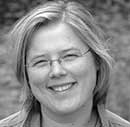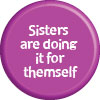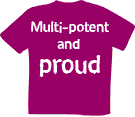Stemistry Inquiry
Sci art and creative thinking
The project described on this website is often called 'sci-art' as it uses art, such as creative writing, drama, cartoons and video, to explore issues that have a scientific dimension. This may be with the intention of creating original art or as a way of opening up a dialogue on important issues with a wider audience than has taken part so far — often both.
PEALS (Policy, Ethics and Life Sciences) uses a range of techniques to allow people to exchange perspectives about recent and potential future developments in science, particularly biology and related areas.
The stemistry project: write all about it
Creative writing provides an accessible way to engage with the public on complex issues, says project leader and writer Lisa Matthews.

"In June and July 2007 a small group of writers met in Newcastle Upon Tyne, UK, to discuss stem cell research. None of us were experts in the field and the only thing we had in common other than our work as creative writers was our interest in science and technology.

"As a writer I look for inspiration for my work everywhere and the register, imagery and concepts of science have been catching the attention of artists for centuries. There’s nothing new in that. If you ask me to define what sci-art is I’d say the answer will vary wildly depending on who’s asking, who’s answering and sometimes who’s funding. Sci-art can be a celebration of both disciplines. The Arts and the Sciences intersect in many places and putting practitioners from both fields together will naturally yield interesting results.
"People aren’t stupid and not all scientists want to take over the world."
"Personally, I am interested in sci-art as a means of making complex issues (like stem cell research) more accessible to those of us who aren't experts in the subject; people unfamiliar with scientific terms and techniques, people who often feel marginalised or worse, patronised by an egghead set that seems to want to keep their discoveries to themselves. People aren’t stupid and not all scientists want to take over the world. Science is stigmatised, demonised and misquoted by a headline-hungry media. It wasn’t a scientist who coined the term 'designer baby’. Sci-art can offer an accessible way to debate these issues.

"Sci-art can be an arbiter and act as a translator for people who want to engage and may have acquired relevant expertise through their life experiences but often don’t even know how to ask the questions running round in their heads. Stem cell technology is being heralded as a unique phase of scientific and medical innovation but it also raises serious ethical and moral issues. The government says it wants to ask ordinary people to share their concerns, thoughts and ideas about stem cell research. And if the government is serious in this desire, sci-art could be an aid to public engagement. As a writer — not a scientist — I feel well-equipped to ask the public how they feel about stem cell research. Why? Because I’m just like them. I’m not a scientist. I don’t speak the language of science, however, my objectivity as a writer can be a real asset, allowing dialogue to develop and grow.
"If you ask people what they think you must allow time to formulate their ideas. Science can be intimidating and sci-art makes reflection possible. Sci-art should not, if done properly, offer any simple solutions. How can it when the questions asked and issues raised are so complex and wide reaching?"
Creative writing workshops
To the uninitiated a writing workshop might seem strange, intimidating, even a bit daft, however, they provide a safe, inspirational and interesting space to explore all sorts of themes and ideas. The workshops with this writer’s group employed sophisticated techniques and exercises because the group was made up of experienced and, in some cases, professional writers. Below are some of the exercises used to get the creative juices flowing.
WRITING EXERCISES
Automatic writing • a process of writing material that does not come from the conscious thoughts of the writer
Vibrant corpse • a word game
Kennings (see alt glossary)
Definitions (see alt glossary)
Point of view • Explore fertility treatment from the point of view of the cells ('in vitro' and 'in utero')
Unpacking • Create metaphors and similes to explore and unpack important stem cell concepts, procedures and terms.
Physical objects • Explore physical objects associated with science and SC research and technology
Self portraits • Create 'self portraits' of SC concepts (e.g. 'self-portrait of a clone / chimera / egg or embryo harvester'